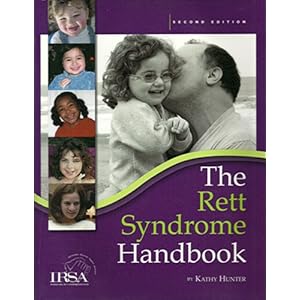R is for Rett Syndrome
Rett Syndrome (RS) is defined as a neurodevelomental disorder of the gray matter (the major component of the central nervous system) of the brain, that almost exclusively affects females. The clinical features include small hands and feet and a deceleration of the rate head growth. Repetitive hand movements, such as wringing and/or repeatedly putting hands in the mouth are also noted. People with RS are prone to gastrointestinal disorders and up 80% have seizures. They typically have no verbal skills, and about 50% of individuals affected are not ambulatory. Scoliosis, growth failure, and constipation are very common and can be problematic. (duh?)
The signs of this disorder are most easily confined with those of Angelman's Syndrome, Cerebal Palsy, and Autism.
There are 4 stages of Rett Syndrome.
Stage 1 usually begins between six and eighteen months, and is often overlooked, because the symptoms are just beginning and are somewhat vague. The infant may have progressed and gained new skills, but at a slower rate or later date then expected. She may have a "floppy" body and a poor suck. This stage usually lasts a few months, but can last more than a year.
Stage 2 begins from one to four years and usually lasts from weeks to months. A general developmental decline is seen with regression and loss of acquired skills. This stage can have a rapid onset or it can be more gradual as acquired finger and hand skills and spoken language are lost. Stereotyped hand movements begin. Breathing irregularities may be noticed, and may include episodes of breath holding and hyperventilation associated with vacant spells. General irritability and irregularity may be seen, and some girls awaken with inappropriate laughing or crying spells. Tooth grinding is common.
Stage 3 usually begins from two to ten years following the rapid destructive period and can last for many years. Regression is now over, and she reaches a stable period. Apraxia, motor problems, scoliosis, and seizures may be more prominent. However, improvement is seen in behavior with less irritability and crying, fewer autistic features and good eye contact. She shows more interest in her surroundings, and her alertness, attention span and communication skills improve. Many girls with RS remain in Stage 3 for most of all of their lifetime. Stage 4, which usually begins after age ten, is characterized by reduced mobility.
Stage4-A is used to describe those who once walked and stopped.
Stage 4-B describes those who were never able to walk. In this stage, muscle weakness, rigidity, spasticity, and scoliosis are prominent features which contribute to loss of movement skills. Feet are often swollen, cold, and bluish. However, there is no further decline in cognition, communication, or hand skills.
Ok, that is the CLINICAL definition of Rett Syndrome. That is what all the experts say. Here is what I say:
My daughter is 8. Her name is Gabby. She loves to laugh and play with her sisters. She loves going to school, her teachers, and just about everything to do with school in general. I won't say she loves physical therapy, but she does love her physical therapist. She wakes up in the morning smiling and goes to bed at night with a smile on her face. She cuddles with us and gives hugs and kisses more then either of my other girls. She will let you know when she wants something, and what she wants...if you pay attention and listen. Not just listen with ears, because Gabby does not talk verbally, but believe me when I say she gets her point across.
When we wake up in the morning at my house, I get woken up by my 10 year old daughter, who knocks on our door and says "Gabby's awake." I get up and go to Gabby's bed and there she is, smiling and waiting for one of us, because she cannot come and knock on our door to tell us herself that she is awake. So, as I lift the side of her bed, (the two younger ones sleep on bunk beds, but Gabby's needed some modifications, like both sides of the bed need to be enclosed so she doesn't roll out of bed) to begin our day, she (almost, I won't say EVERYDAY, but close to it) is happy, ready to go. so I pick her up and carry her downstairs. To start the day, she gets her diaper changed, her medications, getting her dressed, (which she does fight us about), breakfast, (which can take up to an hour to feed her, because she eats very slow and sometimes does not want to eat at all), exercises for her arms and legs to loosen up her muscles. Depending on what day it is, then it is school, in which she gets physical, occupational, and speech therapies. After school, it is a snack and more exercises, and when she isn't utterly drained, we try some practice with her communication, whether it is with her IPAD, or just reading, or trying to get her to answer questions for us. Then, dinner, which again can take considerably longer then most peoples dinners (up to an hour- hour an half), then bath time, and evening medications.
Now on weekends, we try to stay with the schedule, but we also want her (and the other girls) to relax, so we do do some of the therapies and all, but not always.
Gabby spends her time between the couch, the floor and the dining room table. She spends enough time in her wheelchair or other equipment while she is in school, plus we don't have the equipment (other then her chair) here at the house. We wish we did, but it is just not possible right now. Her new wheelchair is currently in the works and has been since October, just to give you an idea of how long even the essentials take. But she plays on the couch or on the floor with her sisters and us, and she is good with that. She just likes being around us and spending time with each of us. Don't get me wrong, Gabby is not a perfect child, she gets in trouble. The "classic" "putting hands in the mouth" is actually a big problem for her because she gets infections in between her fingers, therefore we need to always take her hands out of her mouth. She has arm braces, that one of her doctors loving calls "no-nos". She throws toys, and gets them taken away from her. She hits her sisters, and gets told no.
In December, Gabby was hospitalized for a reaction to a new seizure medication (among other things) for six days. In the 30 days following, she had something like 12 doctor appointments (of course mind you that is besides the other kids). Now in a regular year, a "typical" kid may go to see a doctor maybe 8 or 9 times (and that may be a lot for some), including sick visits. Gabby probably sees at least one doctor or another every 3 weeks or so. Sometimes more. And sick visits are more like regular doctor appointments, because we go to so many of them.
Now the good news, there has been more research on RS in recent years done then ever before. More and more clinical studies come out, it seems every day. I read about new developments probably at least once a month or so. There is so much information out there that it can get very overwhelming, especially for newly diagnosed RS girls. But, if you look at a little bit at a time, digest it, then maybe a little more, you really can get through it. There are support groups and other parents who really do understand what you are going through. Not just RS parents, but any parent with a special needs child. My oldest daughter had a hand in starting a sibling support group at Gabby's school. The group is for "typical" children who have a sibling with special needs so that they can express how they feel about their brothers and sisters.
And just so everyone really does understand, Gabby is my actually my step-daughter. She came into my life almost 4 years ago. So I still feel like I am playing catch up a lot of the time. But, she is the reason that my 10 year old doesn't look at people differently because something is "wrong" with them. She is the reason that my 17 year old wants to become a musical therapist for special needs children. She is the reason her father fights everyday, whether it is for her wheelchair from the insurance company, or because someone is parked on a handicapped parking spot that shouldn't be there. She gives him a reason to want to make things fair, in an unfair world. She is the reason that I learned how strong I can be because she needs someone to be her voice. We are her voice. We are her family. And she is our angel.
I want to thank Crystal for being willing to share a part of her life, and her family's life, with my readers today.
Here are some more links to find out more about Rett Syndrome, and things you can do to help. Wikipedia-Rett Syndrome
Wikipedia-Grey Matter
Rett Syndrome: A Guide
The Rett Syndrome Handbook
by Kathy Hunter
The Rett Syndrome Handbook: In Words You Can Understand From Those Who Understand
By: Kathy Hunter
Amazon
Rett Syndrome Research Trust UK / ReverseRett.org
Rett Girl! and Rettgirl.org (the blog)
Girl Power 2 Cure
For people who are familiar with Rett Syndrome and would like to find out about clinical trials click below:
Clinical Trials
This post is a part of The Blogging From A to Z April Challenge 2012



This is a great post. Thanks for the information.
ReplyDeleteTeresa
Wonderful post. I'd never heard of Rett Syndrome before today, but now I'm so glad you shared it. Thank you.
ReplyDeleteStopping by from the A-Z challenge! Nice to meet you!
http://writeskatedream-jmckendry.blogspot.com
Thanks for stopping by!
ReplyDeleteAnd Crystal wanted me to send her thanks as well. (issues with blogger not letting her post comments)